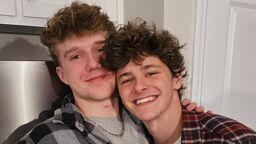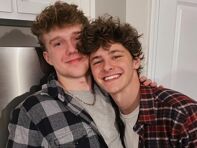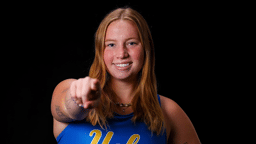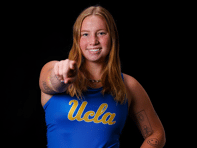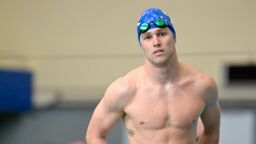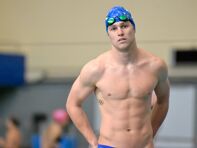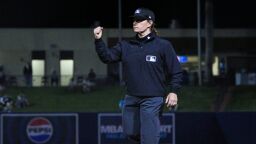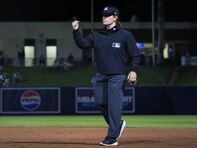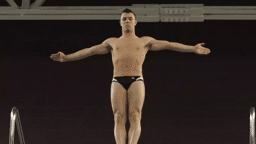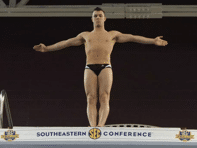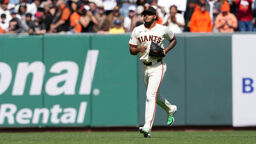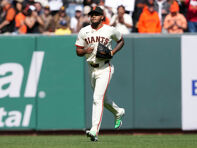All my life, participating in sports was my gateway to having a community.
As the only child of two Portuguese immigrants, I found sports to be my security blanket. Growing up in Falls Church, Virginia, an affluent community a few miles outside of Washington, D.C, it was hard for my family to come up with the extra money to afford the expensive leagues or up-to-date equipment, and the professional training camps my friends could attend were merely a dream.
Not only struggling financially, my parents struggled to communicate in English with the other parents, making it difficult to sign me up for things. However, none of that mattered when I stepped foot on the court, the field or in the pool. I was part of a unit, a system, and to me as a kid that was everything.
As I grew up, I realized from a young age that I was gay. As this became clearer to me, my love for sports was replaced with the fear and anxiety of potential rejection. What if this cost me my place on the team, my community? What if I found out that I no longer belong?
As I look back, my biggest regret in life was hiding who I really am. I had refused to publicly come out prior to freshman year of high school, because I thought it would rob me of the chance to continue playing football with my friends. I did everything possible to bottle up my feelings and adopt the “straight bro” persona, because in my eyes nothing else was accepted.

After my freshman season, a dear friend of mine, who was also gay, helped me come to terms with my identity and understand that I could live my truth. I came out publicly to my friends and my team, and I thought life would immediately change for the better. My fear of rejection started to materialize as my anxiety lead me to believe I lost friends and the respect of the senior players. I was living my truth, but this sense of shame and anxiety would set in with every interaction.
I would eventually find that if I downplayed my sexuality, I would continue to keep my position with the team. I just wanted to be another guy on the field, but all I could do was see myself as “different.”
The friends that I worried about judging me the most — Josh, Nate and Greg — were some of the most supportive people in my life during this time. They constantly assured me that they weren’t going to change their opinion of me because they found out I was gay. I was told many times that, “you being happy is all we want for you.” It led me to become more confident on and off the field.
I continued to play football throughout my sophomore and junior years but would find both seasons cut short due to several on-field injuries. The recovery process took a toll on my mental wellness, and I had come to the realization that I couldn’t be a gay athlete.
Prior to my senior season, I told my teammates and coaches that my prior injuries would keep me from being able to play my final year. However, what I have never told anyone, prior to writing this article, is that I used those injures as an excuse to give up my dreams, to abandon my one true sense of community.
Even to this day, I cannot tell you what made me give up my joy of high school sports, but I can tell you the thing that got me out of it was being able to read stories about other athlete’s overcoming their own issues on Outsports.
While at West Virginia University, I came to accept myself fully during my freshman year of college. While there, I majored in Sport and Exercise Psychology to understand the mind of athletes and how to help curb the fear and anxiety found in sports.

I wanted to use my knowledge to help the next generation of LGBTQ athletes on their journey to self-acceptance. Due to my injuries from high school football, I was familiar with the role of athletic trainer. I felt that this position was my best way to aid in an athlete’s journey. My dream was fully realized as I was accepted into an athletic training graduate program at my dream school late last fall.
As I got excited for the future, I was again met with the fear and anxiety that I was going to again be associated with world of sports and questioned if I would find my place. These thoughts included: Will football players be OK with a gay athletic trainer? Will they respect and trust me? Will my classmates and professors view me different? I again found solace in Outsports, as I read and became inspired by other gay athletic trainers who continue to practice their profession but live their lives without fear and regret.
So here I am, promising to myself and to everyone out there that may ever need the guidance to pursue their dreams. You are worthy of the happiness you seek; you are worth living your truth, and no one deserves the right to make you feel uncomfortable as your own self.
Kevin Pereira, 22, played soccer growing up and played football in high school. He graduated from West Virginia University in December 2019 with a Bachelor of Science in Sports and Exercise Psychology. He will be pursuing a master of science in Athletic Training at The University of Virginia this coming summer. He hopes to use his education in Sports Psychology in the future to help LGBTQ+ and all other athletes be comfortable in their own skin. He can be reached on Instagram @kevosindahouse
Story editor: Jim Buzinski
If you are an out LGBTQ person in sports and want to tell your story, email Jim ([email protected])
Check out our archive of coming out stories.
If you’re an LGBTQ person in sports looking to connect with others in the community, head over to GO! Space to meet and interact with other LGBTQ athletes, or to Equality Coaching Alliance to find other coaches, administrators and other non-athletes in sports.





